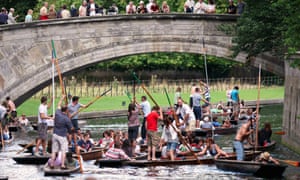As touting for punt trips becomes a crime, is tourism overwhelming Britain’s cities? | UK news
Punting on the river Cam may be a cliched activity, but it is not an obvious crime. Yet the toll of tourism on Cambridge has become so heavy that not only has touting for punt tours been made an offence, but moves are under way that could lead to lawbreakers being imprisoned.
Like Oxford, York and Stratford-on-Avon, Cambridge benefits hugely from being on Britain’s tourist trail, but plenty of residents are beginning to believe a tipping point has been reached. The action against punt touts is just one symptom of the strains of coping with around 5.5 million visits a year.
Visits to Britain by international tourists are up by 9% so far this year, and they are spending 14% more than at the same time last year, a spree fuelled by sterling’s post-referendum decline. Meanwhile, more Britons are holidaying in the UK, in part as a result of the extraordinary rise of Airbnb and other providers of competitively priced self-catering accommodation. It is all adding up to a mad summer for Britain’s tourism honeypots.
One of Cambridge’s tourism sceptics is John Hipkin, a city councillor who admits his complaints make him sound like a “grumpy old manâ€.
“Visiting places is a very agreeable part of modern life,†he says as he leads a walking tour of the city. “But if it gets out of hand it threatens the character of the place you want to visit. The fast food, the litter, the punts …â€
He is interrupted as we pass into an alleyway by another Cambridge man who overhears the conversation.
“We’re overrun,†says the man, a churchwarden reluctant to give his name for fear of offending the diocese of Ely. “[Guy] Burgess [the Soviet spy] said being in Moscow was like being in Cambridge during the long vac [the university’s long vacation in the summer]. Simply utter emptiness. It’s not like that any more.
“There’s a youth hostel near me. In my day you’d get thrown out at 9 o’clock in the morning. Now they give you keys â€" some days I get woken up at 4am by people coming home.â€
King’s Parade, the stretch of road in front of King’s College in the heart of the city, is already busy by 11am, before most coach tours have arrived. The tourists â€" Chinese schoolchildren in uniform, a Spanish group yoked with lanyards â€" navigate their way through a few dozen tour sellers waving clipboards.

“They say they’re selling walking tours, but those tours usually end up at the river,†Hipkin says. “It’s just a cover for punt touts. Local people can’t walk more than five yards before being pounced on.â€
He collars a young man with a clipboard called Jack, who tells us politely that he comes most days from Peterborough to work on commission. “On really busy days it gets shoulder to shoulder along here,†Jack says, after insisting that he tries to approach only people he believes are tourists. “I can see why people get annoyed. But it’s a good job.â€
It has been illegal to tout for business in central Cambridge since September last year, when the city council introduced £75 fixed penalty notices in an attempt to curb the touts. So far more than 40 fines have been handed out, with two prosecutions for repeat offenders.
But punting is lucrative, and there is more demand than the official licensed punt operators can meet, so unlicensed operators have been opening up launch points. Last Tuesday the city council applied to the high court for an injunction, which would mean anyone using the areas for punting business could be prosecuted for contempt of court â€" leading to a fine or even a prison sentence.
The local authority’s stance has been attacked by the punt operators, who believe they are giving young people jobs and not causing any harm. “More people means more money,†said Jack. “Isn’t that a good thing? It all gets spent here in Cambridge.â€
Whatever the downsides, there is no disputing the fact that Britain will see an economic boost from tourism this year. Kurt Janson, the director of the Tourism Alliance, an umbrella body for travel companies, estimates that the sector will contribute an extra £3bn to the economy this year.
“That would be a phenomenal increase, because we got £22.5bn in 2016, which was a record year,†he said.
Numbers of travellers from North America are up 22% â€" and there has been a 25% increase in visitors from the rest of the world, mostly China, Japan, Australasia and the Middle East. The number of EU visitors rose by only 4%.
Modelling by the Tourism Alliance indicates that for every percentage point that the pound rises or falls, there is a 1.29% change in the level of foreign tourists. “So the 15% drop in the pound should mean about a 20% rise in tourism revenues,†Janson said.
He says that for every £54,000 of extra revenue, a job is created. If his projections are right, UK tourism will generate 57,000 jobs this year. That’s just under half of Cambridge’s population â€" not counting tourists.
The industry’s solution to Cambridge’s problem is to encourage tourists to visit other parts of the UK. There are big pushes to direct travellers to Wales, particularly for adventure holidays, while the Discover England fund is spending £40m on promoting the Great West Way, a trail from London to Bristol, as well as the Lake District and the rich musical traditions of Liverpool and Manchester.
Deirdre Wells, the chief executive of UK Inbound, which represents travel companies, said half of all 37 million visitors to the UK go only to London, which is better able to cope. “We are making hay while the sun shines with the fall in the pound,†she said.

0 Response to "As touting for punt trips becomes a crime, is tourism overwhelming Britain’s cities? | UK news"
Posting Komentar